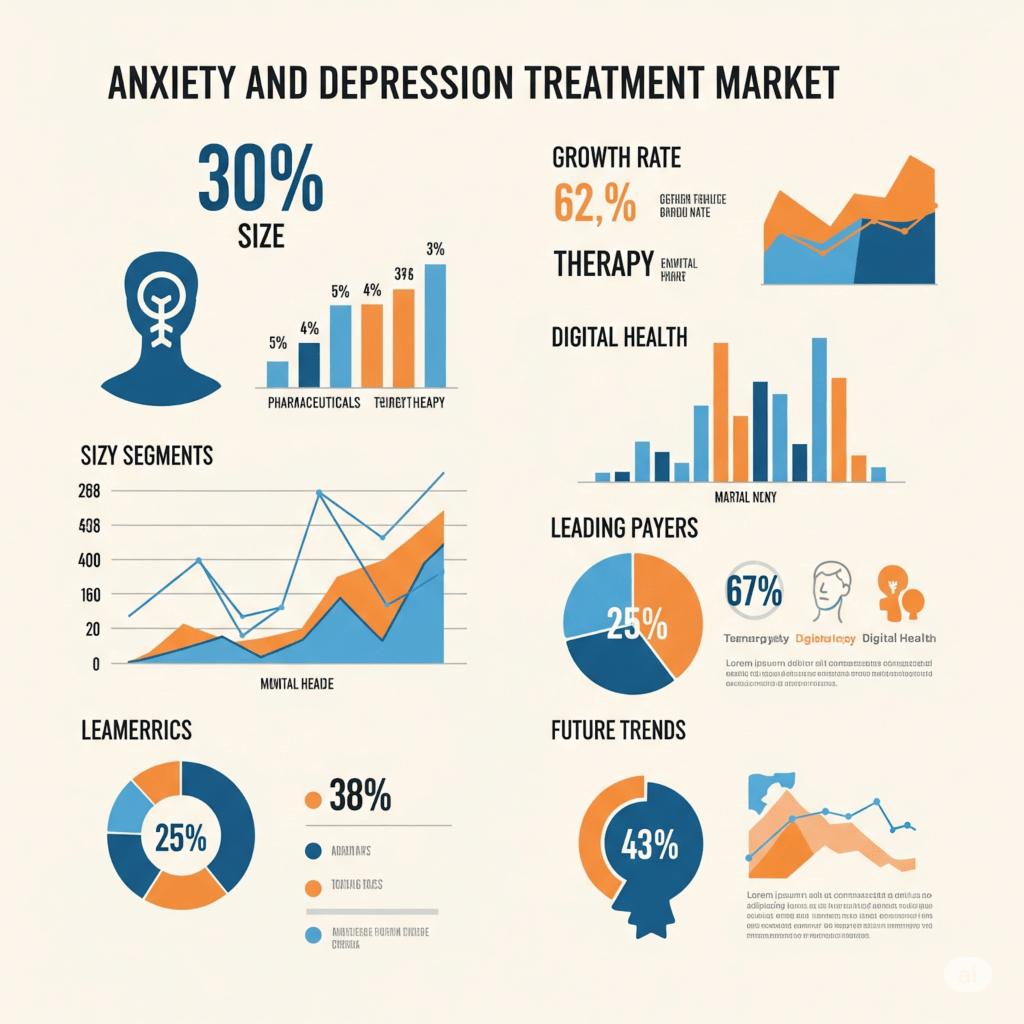
As the global mental health crisis intensifies, the Anxiety and Depression Treatment Market is undergoing a major transformation driven by pharmaceutical innovation, digital therapy adoption, and heightened awareness across all age groups. With millions affected worldwide by anxiety-related disorders and depression, the demand for more effective, accessible, and diverse treatment options continues to grow.
According to Prophecy Market Insights, this market is segmented by product type, indication, distribution channel, and geographic region, offering a comprehensive outlook through 2030.
Mental Health at the Forefront of Global Health Priorities
Mental illnesses like Major Depressive Disorder (MDD), Generalized Anxiety Disorder (GAD), OCD, and Phobia are now recognized as chronic, long-term health challenges requiring both pharmaceutical and therapeutic intervention. The COVID-19 pandemic further intensified the need for mental healthcare, particularly among younger populations and frontline workers.
Rising awareness, destigmatization, and integration of tele-mental health platforms have expanded diagnosis and treatment rates. Governments, private healthcare providers, and insurers are now investing significantly in mental health infrastructure, driving growth across the pharmaceutical, device, and digital segments.
To explore detailed segmentation, forecasts, and competitive insights, download a free sample report.
Market Segmentation: Pharma Dominates, Devices and Therapy Rising
By Product:
- Antidepressant Drugs
- SSRIs (Selective Serotonin Reuptake Inhibitors)
- SNRIs (Serotonin-Norepinephrine Reuptake Inhibitors)
- Benzodiazepines
- Devices and Therapy
SSRIs and SNRIs remain first-line pharmacological treatments due to their well-established efficacy in treating depression and anxiety with fewer side effects than older drugs. Benzodiazepines, while effective for short-term anxiety relief, are facing tighter regulatory scrutiny due to addiction concerns.
An emerging area is non-drug therapies, such as Transcranial Magnetic Stimulation (TMS), vagus nerve stimulation, and cognitive-behavioral therapy (CBT) delivered via mobile apps and virtual platforms. These are gaining traction as either adjunct or standalone options, especially in treatment-resistant cases.
By Indication:
- Major Depressive Disorder (MDD)
- Obsessive-Compulsive Disorder (OCD)
- Phobia
MDD remains the leading contributor to disability worldwide and accounts for the largest market share. OCD treatments are expanding due to rising diagnoses and growing patient awareness. Meanwhile, phobia-related disorders, especially social anxiety and agoraphobia, are gaining attention in post-pandemic mental health care.
Distribution Channels: Digital is the New Normal
By Channel:
- Hospital Pharmacy
- Retail Pharmacy
- Online Pharmacy
While hospital and retail pharmacies continue to serve as primary outlets for prescription medications, online pharmacies and telehealth-enabled prescriptions are reshaping how patients access medications and therapy. The pandemic accelerated this shift, leading to permanent changes in distribution strategy and consumer behavior.
To customize this report by country, indication, or delivery model, click here for tailored insights.
Regional Analysis: North America Leads, Asia Pacific Surges
- North America commands the largest market share due to a high prevalence of depression and anxiety disorders, access to advanced therapeutics, and supportive insurance models.
- Europe continues to invest in national mental health programs and is a key player in the adoption of digital therapeutics.
- Asia Pacific, particularly India, China, and Japan, is witnessing the fastest CAGR. Growing awareness, lifestyle changes, and government-led mental health initiatives are opening opportunities for pharmaceutical firms and digital health startups.
- Latin America and Middle East & Africa are emerging regions, where NGOs and public sector partnerships are working to bridge treatment gaps.
Competitive Landscape: Global Pharma Dominates, Local Players Emerge
Major pharmaceutical and biotech players are making strategic moves via partnerships, R&D initiatives, and regional expansions to serve the surging demand. The focus is now on developing fast-acting drugs, digital therapeutics, and personalized treatment models.
Key companies include:
- Pfizer Inc.
- Eli Lilly and Company
- Johnson & Johnson
- Merck & Co. Inc.
- AstraZeneca
- Bristol-Myers Squibb
- Lundbeck A/S
- GlaxoSmithKline plc.
- Novartis AG
- Sanofi
- Cipla Ltd.
- Glenmark Life Sciences Ltd.
- Lupin Ltd., Sun Pharma, Intas Pharma, Mylan N.V., and Sumitomo Dainippon Pharma
Additionally, startups focused on AI-based mental health diagnostics, telepsychiatry, and mindfulness apps are disrupting traditional care models.
Key Trends & Innovations
- AI-driven predictive analytics for personalized mental health plans
- Digital CBT and remote therapy platforms with chat-based engagement
- Accelerated research on psychedelic-based therapies for resistant depression
- Wearable devices for mood monitoring and early detection
- Integrating mental health into primary care and workplace wellness programs
Conclusion
The Anxiety and Depression Treatment Market is poised for continued evolution as patient-centric, technology-enabled care becomes mainstream. The convergence of pharmaceutical innovation, non-invasive therapies, and digital health platforms is reshaping how societies treat mental illness—turning a crisis into an innovation-driven opportunity.
The macro analyst desk brings highly sought after financial news based on market analysis, insider news and company filings.
